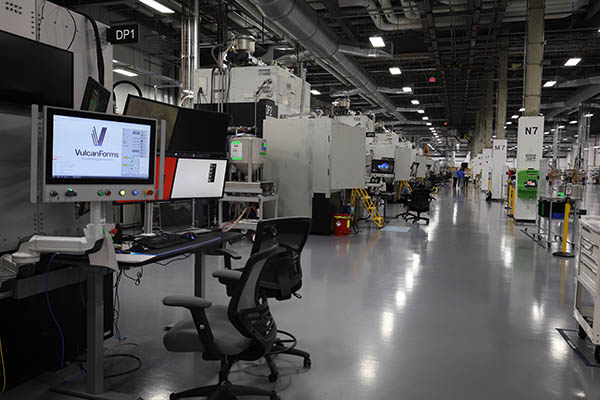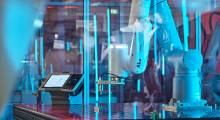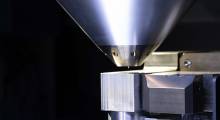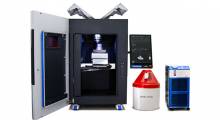Advanced software, materials, and 3D printing are enabling a new generation of manufacturing. VulcanForms Inc., which builds and operates digital manufacturing infrastructure, today announced that it has raised $355 million and that it is valued at over $1 billion. The company also revealed its first production facilities for precision metal parts and assemblies in Devens and Newburyport, Mass.
“By scaling advanced digital manufacturing, we can create a new era of U.S. innovation and economic growth,” said Martin C. Feldmann, co-founder, president, and CEO of VulcanForms. “We’ve recognized a game-changing opportunity when additive manufacturing technology is scaled for industrial production and is seamlessly integrated with automated machining and robotics.”
Founded in 2015 by Feldmann and John Hart, a professor at the Massachusetts Institute of Technology (MIT), VulcanForms claimed that it invented and commercialized the world’s first industrially scalable laser metal additive manufacturing (AM) system and pioneered integrated digital production systems. The Burlington, Mass.-based company currently has more than 300 employees.
Digital approach to address decades of manufacturing decline
Manufacturers perform nearly 60% of U.S. private-sector research and development, and every dollar spent on manufacturing contributes an additional $2.79 to the U.S. economy, a higher multiple than that of any other industry, said VulcanForms. However, manufacturing employment in the U.S. has dropped over 40% since 1980, while wages and capital investment have been largely stagnant, it added.
The company attributed this decline to “decades of offshoring, displacing critical manufacturing know-how and infrastructure to other countries. In many cases, this enabled access to lower-cost labor and expanded global trade, but [it] ultimately hollowed out the domestic innovation ecosystem. While millions of manufacturing jobs were eliminated, supply chains became increasingly sensitive to geopolitical dynamics.”
While most offshore production is not coming back to the U.S. in analog form, said VulcanForms, digital production technologies such as additive manufacturing can enable more innovative, resource-efficient, and resilient supply chains.
“VulcanForms has built the physical infrastructure and digital workflows to deliver this full-stack manufacturing solution at unprecedented speed, precision, quality, and scale,” said Feldmann. “Our technologies, combined with our team of engineering and operations leaders from Google, General Electric, Pratt & Whitney, Precision Castparts, IPG Photonics, Faro Technologies, Schlumberger, Alcoa, [and] Autodesk, among others, enable our customers to innovate, grow, and deliver sustainable impact faster.”
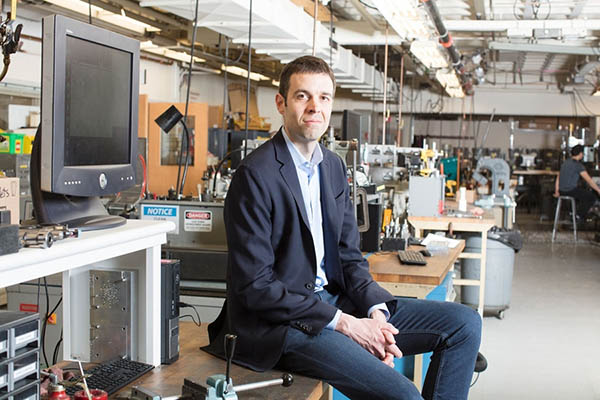
VulcanForms invests in new sites, workers
VulcanForms said its new Devens facility, “VulcanOne,” will be “the world's highest-throughput laser metal-additive foundry.” It will use VulcanForms' 100-kilowatt laser powder-bed fusion AM systems, which will total over 2 megawatts of laser capacity.
The facility will combine the company's proprietary AM technology with a “digital thread” spanning advanced simulation, in-process sensing, and machine learning algorithms to ensure high levels of quality and precision.
VulcanOne will be the result of a capital investment exceeding $100 million and will employ more than 100 people, said VulcanForms. The company also plans to integrate additive production at scale with heat treatment, precision machining, assembly, and inspection.
To that end, VulcanForms has expanded its machining and assembly operations through the acquisition of Arwood Machine Corp. in Newburyport. The Newburyport facility will focus on automated precision machining and assembly operations.
The company said its “end-to-end approach” will allow it to to deliver engineered components and assemblies, designing and operating a “digital-first process chain tailored to each customer’s needs.”
“VulcanForms brings forth metal additive manufacturing as a scalable industrial process and as a cornerstone of breakthrough digital production systems,” said Hart. “Integrated digital production facilities are critical infrastructure which will accelerate domestic and global innovation and draw top talent to the manufacturing sector.”
Funders seek scalability, innovation
VulcanForms’ investors include Eclipse Ventures, Stata Venture Partners, Fontinalis Partners, D1 Capital Partners, Standard Investments, Atlas Innovate, Boston Seed Capital, Industry Ventures, and the Simkins Family.
“There is a fundamental shift in the ways manufacturers need to adapt to global supply chain challenges and the increasing demands for product design flexibility,” said Greg Reichow, partner at Eclipse Ventures and director of VulcanForms. “VulcanForms’ full-stack approach to deliver an engineered solution—combining advanced additive and subtractive technologies merged through a digital thread—will revitalize U.S. manufacturing and hardware innovation.”
“The technologies that enable this agile workflow will dramatically impact the way products are imagined, designed, built, and delivered for decades to come,” he predicted.
The global market for additive manufacturing could experience a compound annual growth rate (CAGR) of 20.8% between 2022 and 2030, reaching $76.16 billion, according to Research and Markets. Market Research Engine offered a more modest prediction of a 13.4% CAGR between 2018 and 2025, reaching $7.3 billion.
VulcanForms’ customers include leading companies in the aerospace, defense, medical, semiconductor, and other critical industries. For instance, the company supplies over a dozen U.S. Department of Defense programs, including the F35 Joint Strike Fighter and the Patriot Air Defense System. It said it has also delivered thousands of components for the semiconductor industry and supported innovation in medical implants.
By combining its data- and simulation-based digital thread with operational excellence, VulcanForms said its integrated approach allows customers to innovate faster. They can produce more without needing to make major capital investments and implement new manufacturing technologies from scratch, the company said.
Article topics
Email Sign Up



